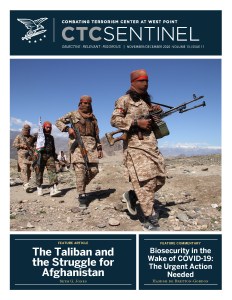From the Editor
In this month’s feature article, Seth Jones examines the evolving threat posed by the Taliban in Afghanistan. “The Taliban is in many ways a different organization from the one that governed Afghanistan in the 1990s. Yet most of their leaders are nevertheless committed to an extreme interpretation of Islam that is not shared by many Afghans, an autocratic political system that eschews democracy, and the persistence of relations with terrorist groups like al-Qa`ida. These realities cast serious doubt about the possibility of a lasting peace agreement with the Afghan government in the near future,” he writes, adding that “without a peace deal, the further withdrawal of U.S. forces—as highlighted in the November 17, 2020, announcement to cut U.S. forces from 4,500 to 2,500 troops—will likely shift the balance of power in favor of the Taliban. With continuing support from Pakistan, Russia, Iran, and terrorist groups like al-Qa`ida, it is the view of the author that the Taliban would eventually overthrow the Afghan government in Kabul.”
In a feature commentary, Hamish de Bretton-Gordon outlines the urgent action needed on biosecurity in the wake of the COVID-19 pandemic. He writes: “For years, the United States and many other countries have neglected biosecurity because policymakers have underestimated both the potential impact and likelihood of biological threats. COVID-19 has had a devastating effect on the planet and could be followed by outbreaks of even more dangerous viral diseases. Meanwhile, advances in synthetic biology are transforming the potential threat posed by engineered pathogens, creating growing concern over biological attacks and bioterror. Given the scale of the threat, biosecurity needs to be a top priority moving forward. Not only do efforts need to be stepped up to try to prevent the next pandemic (natural or engineered), but resilience needs to be built by developing early warning systems, the capacity to track outbreaks, and medical countermeasures, including ‘next generation’ vaccines.” He stresses that “winning public acceptance for public health measures will be imperative to tackling biological emergencies in the future.”
Jason Warner, Ryan O’Farrell, Héni Nsaibia, and Ryan Cummings assess the evolution of the Islamic State threat across Africa. They write that “the annus horribilis Islamic State Central suffered in 2019, during which the group lost the last stretch of its ‘territorial caliphate’ in Iraq and Syria and its leader Abu Bakr al-Baghdadi was killed, does not appear to have had a discernible impact on the overall operational trajectory of the Islamic State threat in Africa” underscoring “that while connections were built up between Islamic State Central and its African affiliates—with the former providing, at times, some degree of strategic direction, coordination, and material assistance—the latter have historically evolved under their own steam and acted with a significant degree of autonomy.”
Paul Cruickshank, Editor in Chief
 Skip to content
Skip to content

